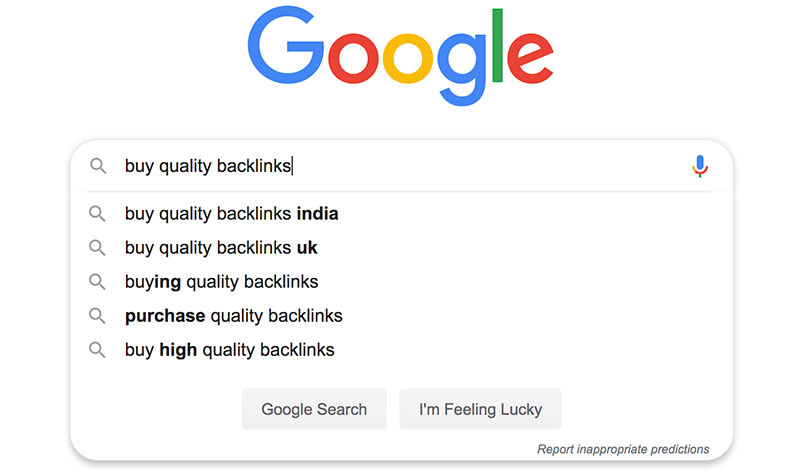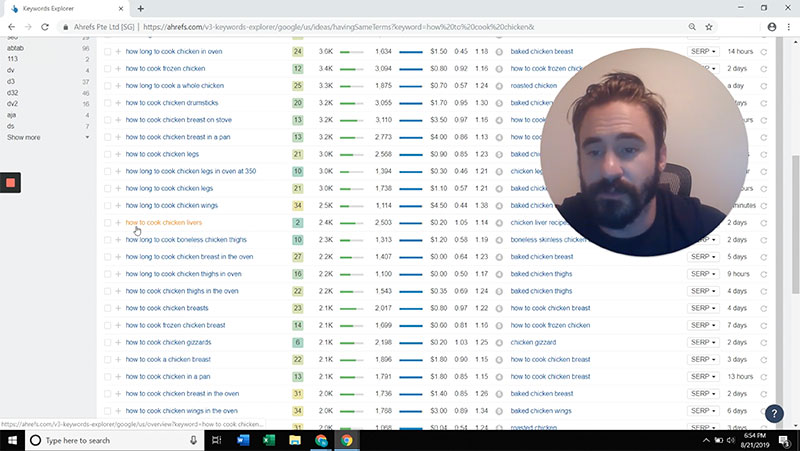What are Fat Head Keywords?
Join the 1,000+ brands that trust us for their link building.
When establishing your business presence online, using quality keywords is vital to profitable Search Engine Optimization (SEO). Keywords are integral to making sure you rank high on search engines, thereby driving traffic to your company and translating to higher earnings.
Search engines use complicated algorithms and formulas to gauge the value of websites and search results. More often than not, these values are directly linked to keywords. Therefore, a lot of research is put into understanding which keywords lead to more traffic.
We’ll take a look at the three main varieties of keywords with an emphasis on fat head keywords, beginning with identifying what they are, how they compare to the other types, and which type is most beneficial to your content marketing strategy.
We will also briefly touch upon related terminologies, such as keyword research and quality traffic.
What are Keywords?

Let’s start with the basics. In a nutshell, keywords (sometimes called “keyword phrases”) are words or phrases that are entered into a search bar. Whichever website you happen to use, keywords have identical functions in that they bring you and the desired information or item together.
Shopping on Amazon or searching for funny videos on YouTube usually requires the use of keywords. If your search terms include a laptop, then you type “laptop” into the search bar. The most popular items often appear first on the list of search results.
By simply typing the word “laptop” into a search bar, you have demonstrated some level of specific intent. That word is associated with a particular set of businesses and marketplaces and has a completely different value than a more general keyword like “computer”.
If each keyword has a different value, then what about the other types of keywords? Do they have different functions and values as well? Most certainly.
As the title suggests, we are going to mainly focus on fat head keywords, their uses, and how they compare to long tail keywords and chunky middle keywords.
What are Fat Head Keywords?

Search terms such as “laptop” are broad keywords. They are simple and lead to nearly infinite results and contain laptops of all types: small, large, heavy, light, expensive, cheap, and so on. This type of keyword is very competitive in that many companies sell this type of item.
This long list of companies selling laptops can easily be reduced if this broad keyword is fine-tuned a bit. All it takes is an addition to your broad keyword. Let’s say you want a particular brand name, say “Samsung laptop”. This keyword has now become a fat head keyword (aka short tail).
Fat head keywords are usually no more than 1 or 2 words and aim closer to the target item of the search. These keywords yield a high amount of traffic, but are slightly more focused than the broad keyword search.
The type of traffic that results in a purchase of your product or service is called quality traffic. A broad keyword search for “laptop” will not likely lead to a purchase, merely a browse. Consumers are more likely to be interested in purchasing if they use a deeper search, which can include a brand name or other identifier.
In a brick-and-mortar shop, the longer a potential buyer hangs around a shop and asks questions, the more likely they are to purchase something. The same can be said for keyword searches. Detailed searches indicate a higher intent to purchase.
This is where long tail keywords come in.
What are Long Tail Keywords?
When neither broad keywords nor fat head keywords are efficiently matching consumer and business, you need to grab the snake by the tail, so to speak. Long tail keywords range from 3 words to longer phrases and are by far the most popular types of searches conducted on the internet.
Back to the laptop example. If your search terms include “best laptops of 2020 under $500” or “2018 refurbished Mac laptops”, then you are delving into territory with a lower search volume. Less people are using these more specific keywords, so the result is less competition.
For example, if your company only sells a few laptops under $500, then you’ll see less traffic within this category. However, if you sell lots of refurbished Macbooks made in 2018, then you’ll flourish. Detailed searches often correlate to high quality traffic, which means consumers that are more likely to buy.
Fat Head Keywords Vs. Long Tail Keywords
Fat head keywords are brief (1-2 words), general, and have a high search volume. A high amount of traffic results from fat head keyword searches. Long tail keywords are more specific phrases that have a low search volume, but consist of more quality traffic.
Search volume (sometimes referred to as keyword volume) for a keyword is a projection of the number of searches put into a search engine for a certain time period, usually a month.
For marketing purposes, fat head keywords have fallen out of favor mostly due to the highly competitive state of SEO these days. There is simply too much content online for every company to have equal access to consumers.
Long tail keywords drive specific traffic while fat head keywords bring in volume of a more general nature. That being said, long tail keywords may require frequent research to keep up with any changing trends.
Another factor to consider is cost. Fat head keywords are pricier because there is more competition for them. Long tail keywords aren’t as competitive, so they are cheaper to rank for. The type of service or product you provide and the promotion budget are important factors to consider.
Directly associated with the cost is risk, which is higher as competition increases. If you gain a high ranking for a fat head search term, your traffic will go up, but that position remains volatile as other companies are vying for your spot.
Long tail keywords are cheaper, so you can buy more of them and split them up across several terms, resulting in lower risk. If your position for one is lost, you still have others that make up for that loss in traffic.
What About Chunky Middle Keywords?
Chunky middle keywords (sometimes referred to as medium tail keywords or “broad match”) are reasonably competitive search terms that fall right in the middle with regards to specificity, traffic, cost, and risk. They are usually 3 to 4 words in length and provide a good value for your money.
A search with the terms “best laptops of 2020 under $500” will give you really precise results compared to the general “laptop” search term. A chunky middle keyword search such as “laptops under $500” offers a balance between the other keywords.
By using chunky middle keywords, the heavy traffic of a fat head keyword or the low competition of a long tail keyword are replaced with moderate traffic and a moderate amount of competitors. Not exactly a best of both worlds scenario, but a safe gamble with normally decent returns.
See: Finding Low Competition Keywords tutorial to learn more about finding easy keywords.
Hopefully by this point, you have a pretty good idea of what these types of keywords are and how they function. The next step is determining what is in the best interest of your business.
Which Type of Keywords Should I Use?

There is simply no easy answer to this question. It all comes down to what you are selling and how people search for the type of product or service you offer. Are you concentrating on a small niche inventory, somewhere in the middle, or are you going big?
You might be thinking, “Why not use fat head, long tail, chunky middle, and broad keywords?” That’s fine, but you have to consider factors such as cost, traffic, risk, and conversions. Conversions mean you have turned users into buyers, which is a component of quality traffic.
The size and diversity of your business can go a long way in determining your plan of action. A smaller or medium-sized business might want to keep it safe and cost-effective by focusing on any combination of chunky medium and long tail keywords, especially if the business is just starting out.
On the other hand, wealthier companies can take a bigger gamble by focusing mainly on fat head keywords. More customers will “walk” into their doors, but many will just be there to browse. Take a hard, deep look at your company and do some keyword research before you fully commit.
Keyword research goes a long way into determining how to get the most quality traffic onto your site. Choosing the right keywords can ultimately lead to a higher ranking website and an increase in traffic. Understanding how your customers search for what you sell is crucial to your success.
Fat Head Keywords Wrap-Up
Fat head keywords are the most popular of the keyword types because they receive the bulk of the search volume, hence the name “fat head” as it appears on a bar graph comparison. These keywords summarize your company in the most concise manner and make up roughly 30% of overall searches.
Due to their popularity, they are the most competitive and expensive, but they drive in the most traffic.
When ranking for chunky middle keywords, you’ll discover a slightly better value for your money and a fair degree of competitiveness, but with often lower returns as a result.
Long tail keywords will make it easier for your customers to find you, especially if you are selling a specialty item or service, but the infrequent traffic may translate to lower profits.
If you have the capital to spare and are willing to take a higher risk with potentially higher returns, then pouring most of your focus into fat head keywords may be the best bet. Fat head keywords take considerable time and money to rank for them.
Regardless of which direction you take, doing the proper amount of research into which keywords translate to success for your business is key.
Contributing Author: Greg Reynaud
 Article by:
Article by:
Chris Tzitzis
Hey I'm Chris, one of the founders here at SirLinksalot. I'm into building internet money machines (affiliate websites) and specialize in building backlinks. Find out more about me and my link building team.
 Questions or Comments?
Questions or Comments?
We are active in our Facebook Group seven days a week and would love to hear from you. Ask us questions, learn from other group members, and share your knowledge.
Related Posts
Ready To Start Building Your Rankings?
Your link building journey to the top of Google starts today!
Apply for Managed Link Building to get a free analysis and game plan, or order backlinks a la carte.
Link building services that work.


